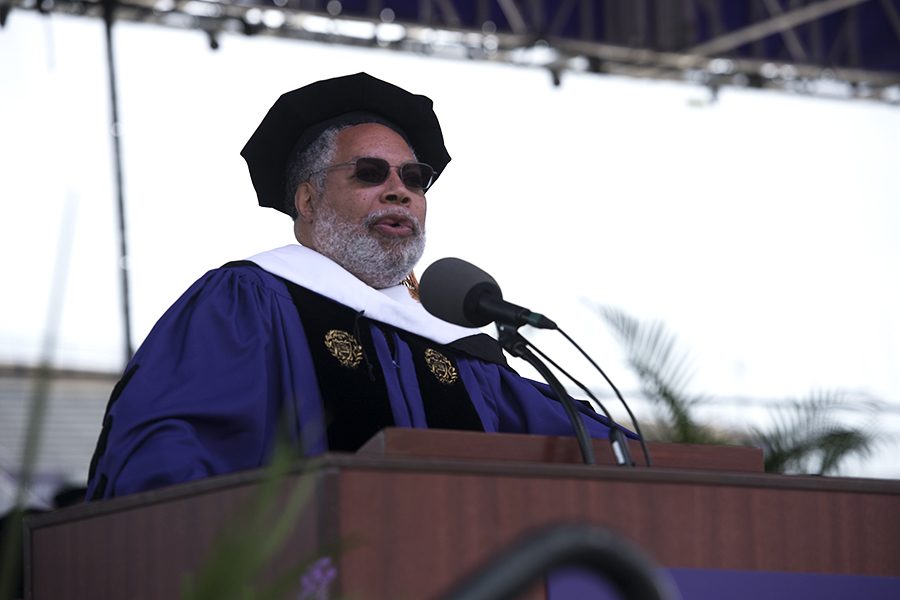Commencement speaker Lonnie Bunch reminds graduating students to ‘fight the good fight’
Catherine Buchaniec/Daily Senior Staffer
Historian Lonnie Bunch addresses graduates and families during the 2019 commencement ceremony at Ryan Field. Bunch was one of six who received honorary degrees on Friday.
June 22, 2019
According to 2019 commencement speaker Lonnie Bunch, the experiences found at Northwestern are ones that will help guide the new graduates through “even the most difficult times.”
Bunch is the 14th secretary at the Smithsonian, the first African American to ever lead in that position. Before he assumed the role earlier this month, Bunch was the founding director of the Smithsonian’s National Museum of African American History and Culture. Prior to that, he served as the president of the Chicago Historical Society.
The historian and educator received an honorary degree during the ceremony and spoke to graduates Friday at Ryan Field, discussing subjects including race, the responsibility to give back and the power of a story to inspire action.
Graduating senior Faalon Andrews (Communication ’19) introduced the speaker, who she said considers himself “just a guy from New Jersey.” She noted the importance of Bunch’s work — through the museum, he opened doors by giving “a voice to those who are anonymous,” showing how race shapes the world, and wanting to make the country a better place.
“This ‘guy from New Jersey,’ whose work is deeply personal, who doesn’t put his identity in a bag when it comes to his work, wants to build a place to make the country better,” Andrews said. “So let’s make something clear today — Secretary Bunch is not just ‘some guy from New Jersey.’ He is the writer of our stories, the amplifier of our voices.”
Andrews also praised fellow graduates in her speech while remembering female, black, queer and transgender students who did not have the opportunity to be in the same position.
During his talk, Bunch drew from his familial experiences — he said his paternal grandparents were sharecroppers in North Carolina who were able to attend night classes and graduate college after 11 years, which gave them a chance to change the trajectory of their family.
“This is more than a story about my family,” Bunch said. “It’s a story about the individual’s opportunity to affect change. One of the most important lessons I’ve learned is to think beyond yourself… As college-educated adults, you should remember to fight the good fight. There is a greater good that transcends individual gain or personal achievement.”
At the end of his speech, Bunch reminded students to receive sustenance and guidance from others and not be afraid of reaching out for help. He said college is where he learned to love the past and draw inspiration from other people’s stories — this education is what readied him, and will ready new graduates, to face “the challenges of the rapidly changing world outside this campus.”
“With this diploma comes the responsibility to use your skills, to use your creativity, to use your education, to live a good life,” Bunch said. “But that good life means making it better for someone else.”
Email: [email protected]
Twitter: @mar1ssamart1nez


